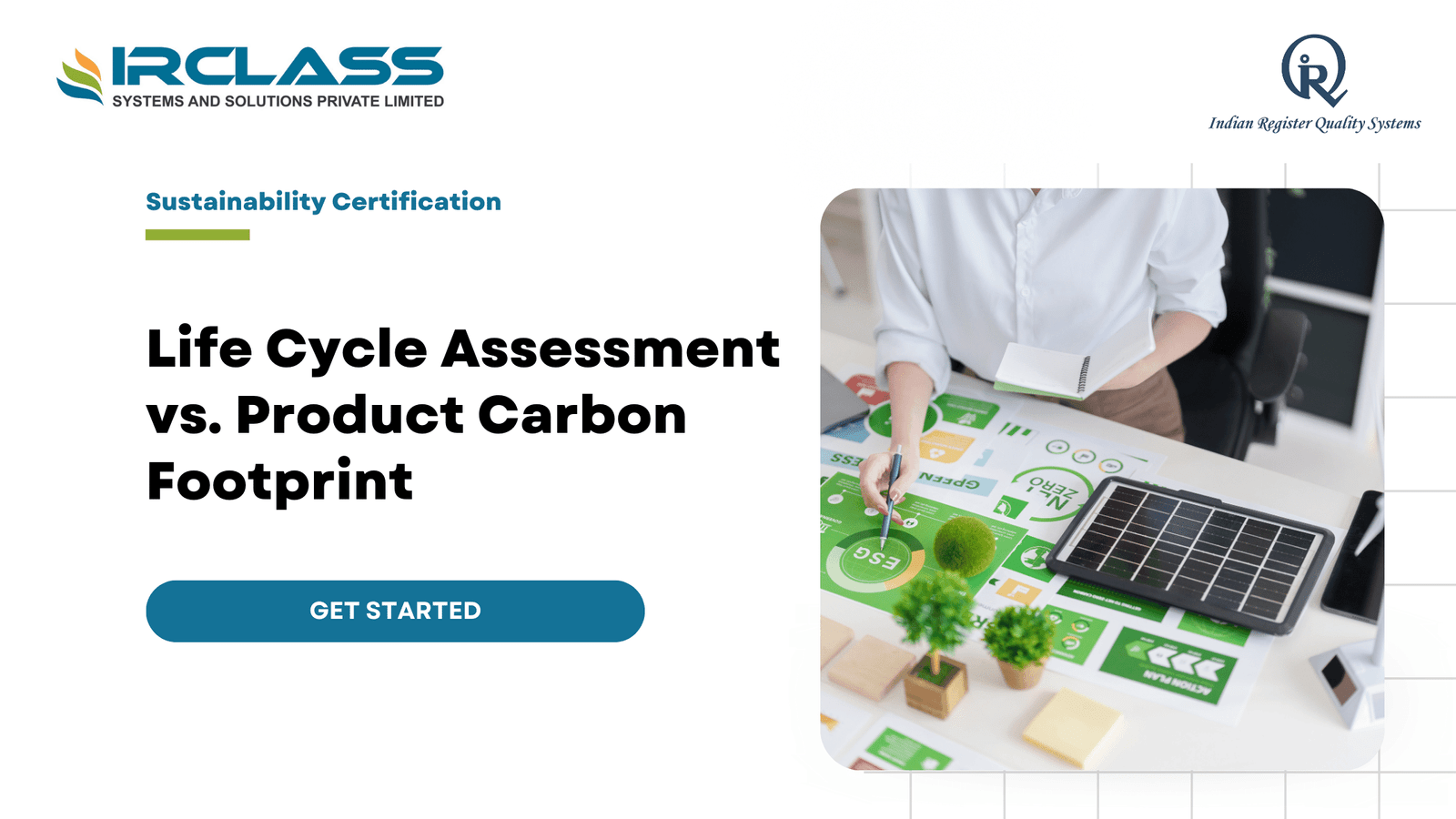Category: Sustainability Certification
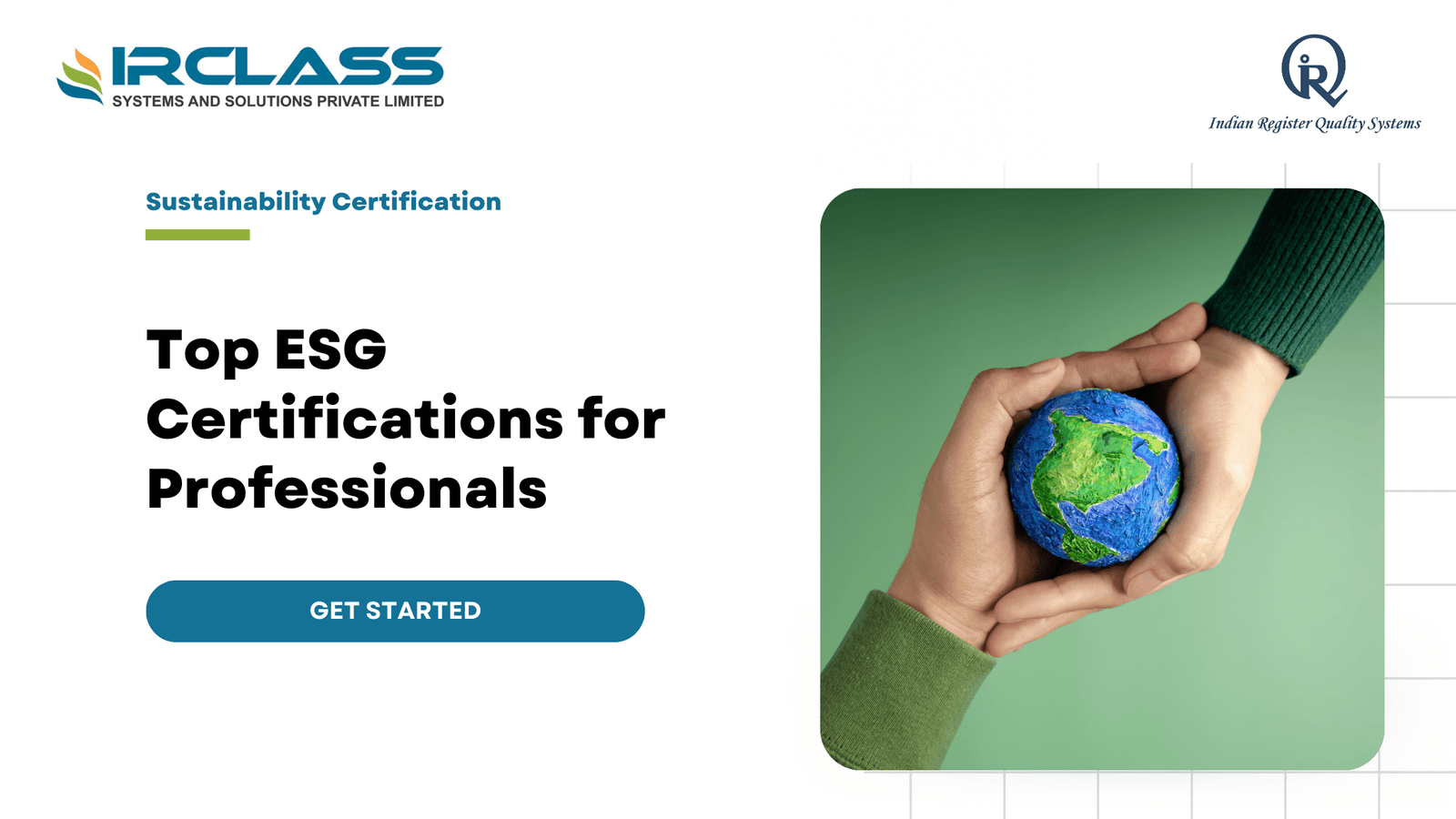
Top ESG Certifications for Finance, Sustainability, and Compliance Professionals
Finance, sustainability, and compliance are now deeply connected through ESG. Whether you’re managing risk, allocating capital, or aligning with regulations, ESG is part of your role. But ESG frameworks are complex. Investors want accurate disclosures. Regulators expect transparency. Boards demand strategy. Professionals need the right training to keep up, and that’s where ESG certifications matter. A good ESG certification teaches you how to interpret data, follow global standards, and apply ESG thinking to your daily work. Whether you’re building an investment model, conducting a sustainability audit, or writing a compliance report, the right certification helps you do it with accuracy and confidence. Why ESG Matters in Finance, Sustainability, and Compliance Each of these fields touches ESG in a different way. In finance, ESG influences credit ratings, valuations, and long-term investment decisions. In sustainability, it drives climate strategy, net-zero targets, and social impact. It is not about compliance; it is about aligning with international standards such as TCFD, GRI, and CSRD and avoiding greenwashing. Without proper ESG knowledge, even the best professionals make mistakes. They misread disclosures. They apply the wrong metrics. Or worse, they leave out key risks. ESG certifications reduce that gap by training people in standards, risk assessment, and data reporting. How ESG Certifications Support Different Roles In finance, certifications help you integrate ESG into models and portfolios. You learn how to assess climate risks, interpret sustainability disclosures, and apply ESG metrics in credit decisions. This is now critical for investors, lenders, and risk managers. In sustainability, certifications are more in-depth in terms of carbon accounting, supply chain risks, and stakeholder engagement. You get to know how to develop sustainability strategies that are compliant with regulations and investor demands. In compliance, the focus is on frameworks and assurance. You learn how to map ESG risks, assess materiality, and ensure your company’s reports meet legal and audit standards. Core ESG Skills Professionals Must Learn A certification must teach practical, usable skills. Not just theory. ESG professionals now deal with: These are not optional skills anymore. Without them, professionals can’t meet the expectations of regulators, auditors, and investors. Choosing a Certification That Aligns With Your Role Certifications vary in depth and focus. Some are entry-level, built for people just entering the ESG field. Others are advanced and designed for senior professionals working in risk, finance, audit, or strategy. Choose a certification that fits your function. If you’re in finance, you need a certification that focuses on ESG integration in investment and credit. If you’re in compliance, you need something focused on disclosures and regulatory frameworks. If you’re in sustainability, you need one that goes deep into net-zero targets and lifecycle analysis. A one-size-fits-all ESG certification rarely works. ESG roles are too diverse. Pick one that supports your specific career path. How ESG Regulations Are Changing the Job Landscape Across the world, ESG regulations are increasing. The EU has introduced CSRD, which mandates detailed ESG disclosures. India has made BRSR reporting compulsory for top-listed firms. The U.S. SEC has proposed climate risk disclosures. Other regions are updating their guidelines every year. This has created demand for ESG-literate professionals. Companies need people who know how to read and write ESG reports, validate ESG data, and align disclosures with global frameworks. ESG certifications are now seen as essential by HR and compliance departments. In job descriptions, “ESG certified” is no longer a bonus. It’s often a requirement. What Makes a Certification Credible There are many ESG programs in the market. But not all of them are recognized. A credible certification should follow global standards. It should offer in-depth content and updated case studies. It should be backed by industry recognition. The trainer profile also matters. You want instructors who have worked in ESG implementation, not just theory. You also want real examples of how companies handled ESG audits, how regulators reviewed sustainability disclosures, and what mistakes to avoid. Look for certifications that include: Format and Delivery Options That Work for Busy Professionals Most ESG professionals are already working full-time. That’s why the format of the certification matters. Some programs are self-paced online courses. Others offer live sessions or workshops. Some include case studies, quizzes, and simulations. If you’re in a technical role like internal audit or compliance, you may benefit from instructor-led sessions. If you’re in strategy or consulting, a project-based certification may be more useful. Choose a format that matches how you learn and how you work. The Link Between ESG Certification and Career Growth Professionals with ESG certifications are getting promoted faster. They’re also being hired for specialized roles like: These roles didn’t exist a few years ago. Now they’re in demand across sectors like banking, manufacturing, technology, and infrastructure. ESG certifications give professionals the edge because they show readiness. Not just interest, but capability. Hiring managers look for proof of knowledge. Certifications provide that. Future-Proofing Your Skills With ESG Training ESG is not a trend. It’s a shift in how businesses operate and report. Financial disclosures now come with ESG metrics. Strategic plans now include climate and social risk. Boards are asking questions they never asked before. This shift will continue. New laws will come. Reporting expectations will grow. Investors will want deeper insights. ESG-certified professionals will be the ones ready to answer. Getting certified now prepares you for what’s coming. Conclusion Professionals in finance, sustainability, and compliance all play a role in ESG success. However, to meet the rising expectations of regulators, boards, and investors, they need proper training. ESG certifications provide that training, along with credibility and career mobility. IRQS offers globally aligned ESG certification programs that are designed for real-world application across sectors, job roles, and reporting requirements. If you’re looking to build expertise that lasts, start with a certification that fits your future. FAQs 1. To whom is an ESG certification applicable? It should be considered by anyone working in the fields of finance, sustainability, compliance, internal audit, or strategy. The SG certifications can guide you in knowing the frameworks, evaluating risks, and aligning your
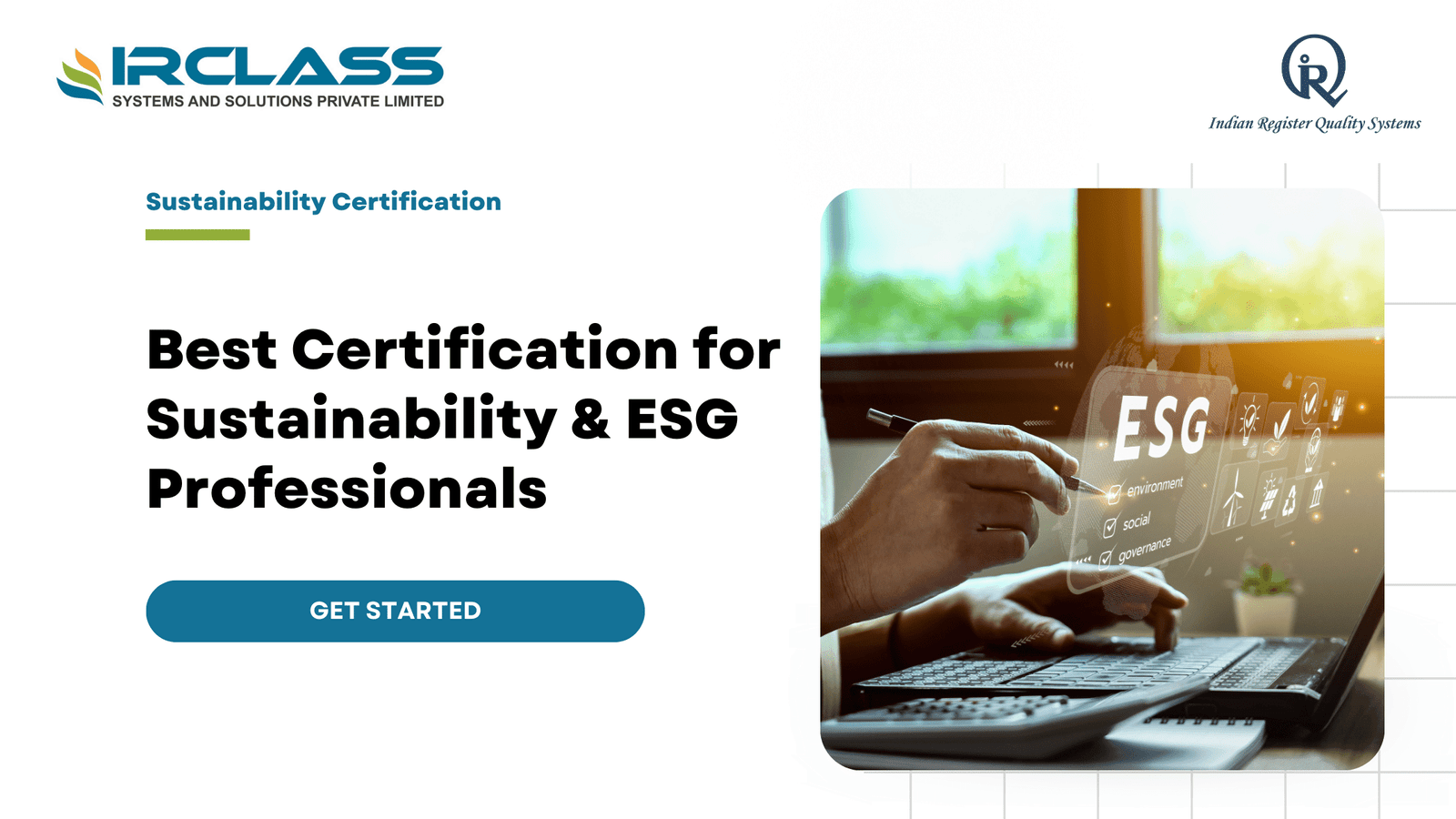
What’s the Best Certification for Sustainability & ESG Professionals
Sustainability and ESG are no longer optional. Shareholders, regulators, and consumers want companies to report on their effects on the environment, society, and governance. To meet these demands, businesses need experts who are conversant with ESG frameworks, reporting standards, and compliance. Certifications render these professionals relevant and credible. Sustainability and ESG have many certifications. Some are strategy-based, some are reporting-based, and others are audit-based or risk management-based. The decision to follow one or the other is based on your position, sector, and goals. The relevant certification will unlock the gateway to employment in ESG consulting, compliance, climate risk, and sustainability reporting. Why ESG and Sustainability Certifications Matter Companies need certified professionals because ESG reporting is complex. It involves understanding climate disclosures, sustainability risks, social impact, and governance frameworks. These frameworks differ by region and regulation. Certifications provide structure and help you show that you can handle this complexity. Certifications also build trust. When a company hires someone with a recognized credential, they know this person meets global standards. Whether it’s developing a net-zero strategy or conducting ESG audits, certifications prove your skills. Key Areas Covered by Most ESG Certifications While each certification has its own focus, most of them include: Some programs go deeper into one area. If you want to specialize in climate risk or ESG strategy, you need to pick a certification that aligns with that focus. What to Look for in a Good ESG Certification Not all certifications are the same. Some are better suited for entry-level professionals, while others are made for senior leaders. The delivery format, global recognition, and technical depth all matter. If you’re just starting out, look for a foundational course that explains the basics of ESG. If you’re already working in compliance or risk, you need something more technical, with case studies and standards training. If you’re in internal audit, choose a course with ESG assurance modules. You also want a program that updates content regularly. ESG is evolving. What was relevant last year may not meet today’s disclosure requirements. Make sure the certification includes the latest frameworks. Certifications That ESG Professionals Consider There are certifications focused on corporate sustainability, and others that go deeper into ESG investing, disclosure, and assurance. Some are global; some are region-specific. Some are accredited; others are not. Professionals working in listed companies or firms subject to sustainability reporting regulations usually prefer certifications that include frameworks like TCFD, GRI, and the EU CSRD. ISO-based certifications are a better fit for assurance and internal audit roles. These include training in risk-based approaches, sustainability audits, and data validation. Certifications linked to ISO standards are also widely accepted. They follow a globally recognized structure and often include practical audit training. How These Certifications Are Structured Most ESG certifications follow a modular structure. You start with basic concepts like sustainability, governance, and risk. Then you move into reporting frameworks. Finally, you may go through case studies or simulations. Some courses are online and self-paced. Others are classroom-based with live instruction. If you’re working full-time, online options with flexible schedules help. But if you need networking or peer learning, classroom training works better. Some programs include exams. Others require a project or a case study analysis. Choose based on how you prefer to learn and prove your skills. What Companies Expect from ESG-Certified Professionals Today, companies don’t just want general sustainability awareness. They want you to know specific frameworks. They want people who can read ESG data, build a report, and review it for errors. In an internal audit, they want people who can validate disclosures. In compliance, they want people who can map ESG risks to regulatory guidelines. Some roles demand sector-specific ESG knowledge. For example, energy companies want professionals trained in Scope 3 emissions reporting. Financial institutions want people who understand climate risk in investment portfolios. A good ESG certification prepares you for these specific demands. The Global Shift Toward Mandatory ESG Reporting Many countries now require ESG disclosures. The EU has already enforced the Corporate Sustainability Reporting Directive (CSRD). India has mandated Business Responsibility and Sustainability Reporting (BRSR) for top-listed companies. The U.S. is moving toward climate-related disclosures. Other countries are catching up fast. This means that additional companies must find ways to identify and disclose ESG threats. Certified professionals are in demand because they bring clarity into the reporting process. They know what to disclose and how to present it to the regulators and investors. How to Choose the Right Certification for You Selecting the proper certification is a matter of your objectives. To work in strategy, choose a course that teaches ESG leadership. If you want to audit ESG reports, consider an assurance-oriented program. If you are in operations, seek training that connects ESG to business operations. Ask yourself: Don’t just look at the brand name. Look at the syllabus. Look at the trainer profiles. See who recognizes the certification. Talk to people who’ve taken it. How ESG Certifications Help You Stay Ahead The ESG field is still new, and it’s growing fast. Companies are building teams for ESG strategy, compliance, risk, and audit. They want people with proof of skills. ESG certifications help you stand out in job applications. They also help you make better decisions if you’re already in a leadership role. Certifications show you’re serious about the field. They show you understand sustainability beyond buzzwords. They give you frameworks, tools, and language to work with legal teams, auditors, and investors. They also help you build confidence. When you’re asked to lead a sustainability project or respond to a regulatory inquiry, you know what to do. You don’t guess. Conclusion The most useful certification is the one that can help you address the actual ESG issues. You may be involved in climate disclosures, ESG audits, or sustainable procurement, and you need training that is practical and up to date. The certifications provided by IRQS are internationally accepted, ISO-aligned, and practical in real-life ESG application. When you are serious about a career in sustainability, then
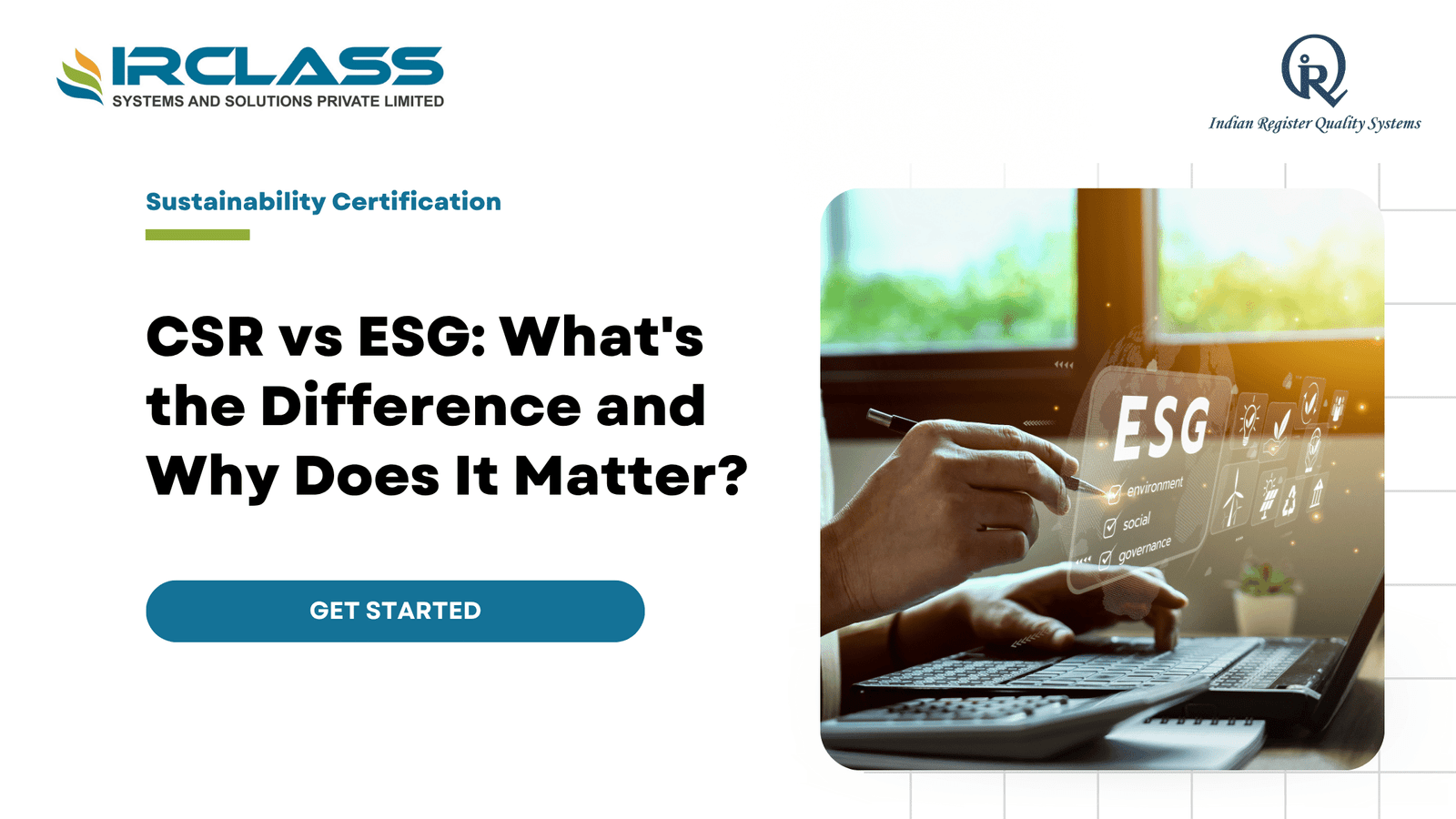
CSR Reporting vs ESG Reporting: What’s the Difference and Why It Matters
Firms desire to demonstrate that they are responsible. They desire to appear good to the customers, investors and employees. Two of the ways they attempt to do that are CSR and ESG. Yet they are not identical. These words are usually used interchangeably, yet they are not synonymous. The distinction is important to businesses, investors, and stakeholders. What is CSR Reporting CSR is the abbreviation of Corporate Social Responsibility. CSR reporting refers to the situation where a company reports on what it is doing to become a good corporate citizen. This normally involves social, environmental and ethical projects. It is all about good doing. CSR includes such things as: CSR reports are qualitative in nature. They explain activities and initiatives. The idea is to gain trust and demonstrate that the company is not only interested in profits. It is generally directed to the general population, workers, and occasionally regulators. What is ESG Reporting ESG stands for Environmental, Social, and Governance. ESG reporting is about data. It tracks how a company performs in these three areas using measurable indicators. The goal is to provide investors with information to assess risk and long-term value. ESG reports include: This is not just about values. It is about performance. ESG is designed to help financial stakeholders understand how well a company is managing non-financial risks. The Main Differences 1. Scope and Focus CSR is broad and value-based. It shows a company’s commitment to social good. ESG is focused and data-driven. It shows a company’s performance in key areas that affect long-term value. CSR might include starting a community recycling program. ESG would report how much waste was reduced and how that compares to industry benchmarks. 2. Purpose and Audience CSR speaks to the public. It builds brand image and trust. ESG speaks to investors. It helps them decide where to put their money. CSR is good for PR. ESG is good for business strategy and risk management. 3. Measurability and Standards CSR reporting is often anecdotal. It tells stories. ESG reporting uses hard data. It follows frameworks like GRI, SASB, and TCFD. These allow investors to compare companies side by side. CSR might say a company promotes work-life balance. ESG would show employee turnover, retention rates, and engagement metrics. 4. What Drives It CSR is driven by internal values. It is about doing what feels right. ESG is driven by external pressure. Investors, regulators, and markets demand accountability. CSR started as a moral decision. ESG is now a financial necessity. Why the Difference Matters It matters because mixing them up leads to confusion. Companies need to understand which one to focus on depending on the goal. For Businesses: CSR helps build culture and employee loyalty. ESG brings in investors and prepares the company for future regulations. Both matter, but they serve different purposes. For Investors: Investors want data. ESG helps them assess risk, sustainability, and long-term financial health. CSR won’t give them what they need to make decisions. For Stakeholders: Customers and communities want to know that companies care. CSR helps tell that story. ESG shows that it’s not just talk, but measurable action. CSR Is the Philosophy. ESG Is the Proof. CSR is a company saying, “We care.” ESG is a company showing, “Here’s how we’re doing.” One is about intention. The other is about accountability. You can have CSR without ESG, but it’s just storytelling. You can’t have strong ESG without the foundation of CSR, because you need values to guide what you measure. What Companies Need to Do Now The Role of Regulation in Pushing ESG Forward Governments and regulators are now stepping in. ESG is no longer just a nice-to-have. In many industries, it’s becoming a requirement. Global bodies like the European Union have introduced regulations such as the Corporate Sustainability Reporting Directive (CSRD). India has introduced the Business Responsibility and Sustainability Reporting (BRSR) framework. These are pushing companies to disclose specific environmental and social metrics. This is a major shift from the voluntary nature of traditional CSR. Regulators now want measurable outcomes. Companies that fail to report ESG data may face fines, lose investor trust, or struggle to access capital. Reporting is also being tied to tax benefits and public procurement eligibility. This means companies can’t just write feel-good stories anymore. They need real numbers. They need data they can stand behind. ESG helps ensure that the business is not only doing good but also protecting itself against future legal, environmental, and reputational risks. Companies that get ahead of these requirements will have a competitive advantage. Those that don’t will be left behind. Regulation has moved ESG from marketing to mandatory, and businesses need to act now. Why ESG Brings More Value Than CSR Alone CSR shows the world that a company wants to do the right thing. That matters. But ESG adds a layer that CSR cannot deliver—proof. Investors, banks, insurers, and regulators want evidence. They want to know if a business is future-proof. ESG gives them that. It’s not about reporting for the sake of it. ESG data can uncover risks before they become problems. For example, high energy use today may become a financial liability tomorrow if carbon taxes increase. A lack of diversity today could turn into a talent drain and reputational risk later. Good ESG practices improve decision-making, reduce costs, and increase access to funding. CSR helps a company look good. ESG helps a company stay strong. It connects non-financial factors to financial outcomes. That’s why ESG is now part of many investment strategies, credit scoring models, and supply chain audits. This is where companies need to shift their mindset. CSR is not enough anymore. It’s a part of the picture, not the full story. ESG brings structure, benchmarks, and accountability. In today’s economy, that brings more long-term value than branding alone ever could. Where IRQS Fits In IRQS collaborates with companies to ensure that they are doing both CSR and ESG right. They give confirmation and security to sustainability reporting. They assist
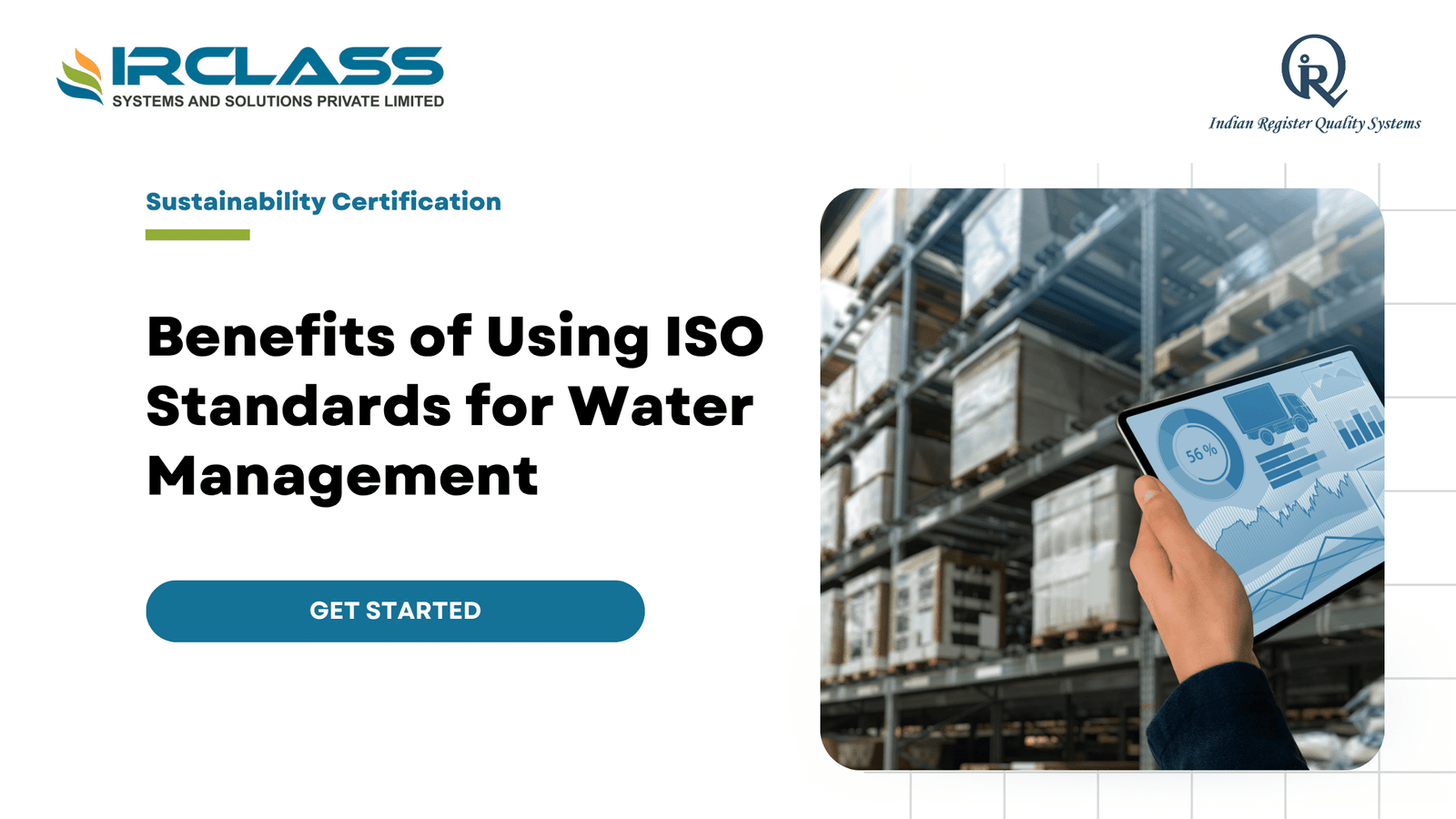
ISO Standards Supporting Water Neutrality: What You Need to Know
Water scarcity is now a business problem. It’s no longer limited to climate reports or policy discussions. Companies across sectors are under pressure to cut down water usage, recycle more, and prove they are not draining shared resources. This is what water neutrality means: balancing what you take with what you give back or reuse. But achieving it is hard. Most companies don’t even know how much water they use. Or where the losses are. Or what a realistic target looks like. This is where ISO standards come in. There is no single ISO standard labeled “Water Neutrality.” Instead, a group of related standards supports it. Together, they provide what most companies lack: a system. With structure. With metrics. With accountability. This document explains how each standard contributes, what actions they demand, and what outcomes they deliver. ISO 46001: Water Efficiency Management System This is the main ISO standard for managing water use. It is built like ISO 9001 or 14001. It gives a system to control water use in any type of organization. Key points: Why it matters: Companies usually look at their water bill and guess. ISO 46001 stops that. It builds a repeatable way to manage water, with data. The benefit is real: lower bills, fewer leaks, better planning. ISO 14046: Water Footprint This criterion is on impact. It is regarding the greater good, i.e. the environmental cost of water used in a product or process. It waters using life cycle assessment (LCA). Key points: Why it is important: ISO 46001 tells you how much water you are taking. ISO 14046 will tell you what kind of damage that water consumption is causing. It is not volume, but location, timing and scarcity. This is necessary to companies that produce products in bulk. ISO 24510, 24511, 24512: Water and Wastewater Services These are to utility and service companies anyone who provides water or who deals with wastewater. It is all about quality, reliability, and sustainability of services. Key points: Why it is important: This is the spine of governments and utilities. Yet even privately operated water systems, which operate internally, such as in industrial parks, can utilize this to reduce expenses and achieve regulatory objectives. ISO 14001: Environmental Management Systems ISO 14001 is not just about water. It encompasses all environmental effects. However, it gives the umbrella under which ISO 46001 and 14046 can work. Key points: Why it is important: The majority of companies are already ISO 14001 compliant. Therefore, the incorporation of water-related standards into the current systems is time-saving and non-duplicative. Supporting ISO Standards Other ISO standards support water neutrality in indirect but important ways: These don’t drive water neutrality alone, but they enable safety, continuity, and cross-efficiency. Business Benefits Reduced Operating Costs Water is costly and it is increasing in price. ISO 46001 assists in cutting down on wasteful consumption. ISO 14046 assists in redesigning and sourcing. Regulatory Readiness Most nations are introducing water regulations. ISO systems maintain records and show compliance. Improved ESG Reporting ESG audits include water use and discharge. The ISO standards assist companies to report in a reliable way, in a language that is understood by investors. Improved Reputation Customers are observing. Suppliers are so too. The fact that ISO water certifications are being made is evidence that something is being done. Sustainable Growth Scarcity of water may restrict growth. ISO systems assist companies in making better use of water and making it more sustainable, which opens up future capacity. Implementation Challenges Initial Cost Setting up these systems takes time and resources. But the ROI is strong: usually under three years. Data Gaps Many companies don’t have water data systems. Meters are missing or uncalibrated. Fixing that is step one. Cultural Shift Changing water habits inside a company is slow. ISO helps by forcing consistency. It turns change into policy. Auditing Pressure Once certified, companies must maintain it. This means ongoing documentation, review, and re-training. How to Begin Real-World Example: Multi-Site Manufacturer A large Indian textile company had high water bills and low recycling. They used ISO 46001 to track water use at 6 plants. Leaks and losses were found. Rainwater systems were added. Water usage dropped 28% in 18 months. They added ISO 14046 to measure product-level impact. Customers now ask about water data, and the company is ready to answer. Conclusion: Why IRQS Matters Water neutrality is becoming a must-have for businesses. The standards are available. The benefits are proven. But implementation is not easy. You need a partner who understands the technical standards and the business realities. IRQS fits this role. They have certified over 5000 clients. They offer ISO 46001, 14046, 14001, 24510, and more. They don’t just certify. They train. They consult. They help companies move from intention to action. IRQS has worked with manufacturers, utilities, food companies, IT parks, and more. They bring real-world experience. Their trainers and auditors understand what works and what doesn’t. For any business serious about water neutrality, IRQS is the right place to start. They help you avoid delays. They help you meet standards. They help you get results.
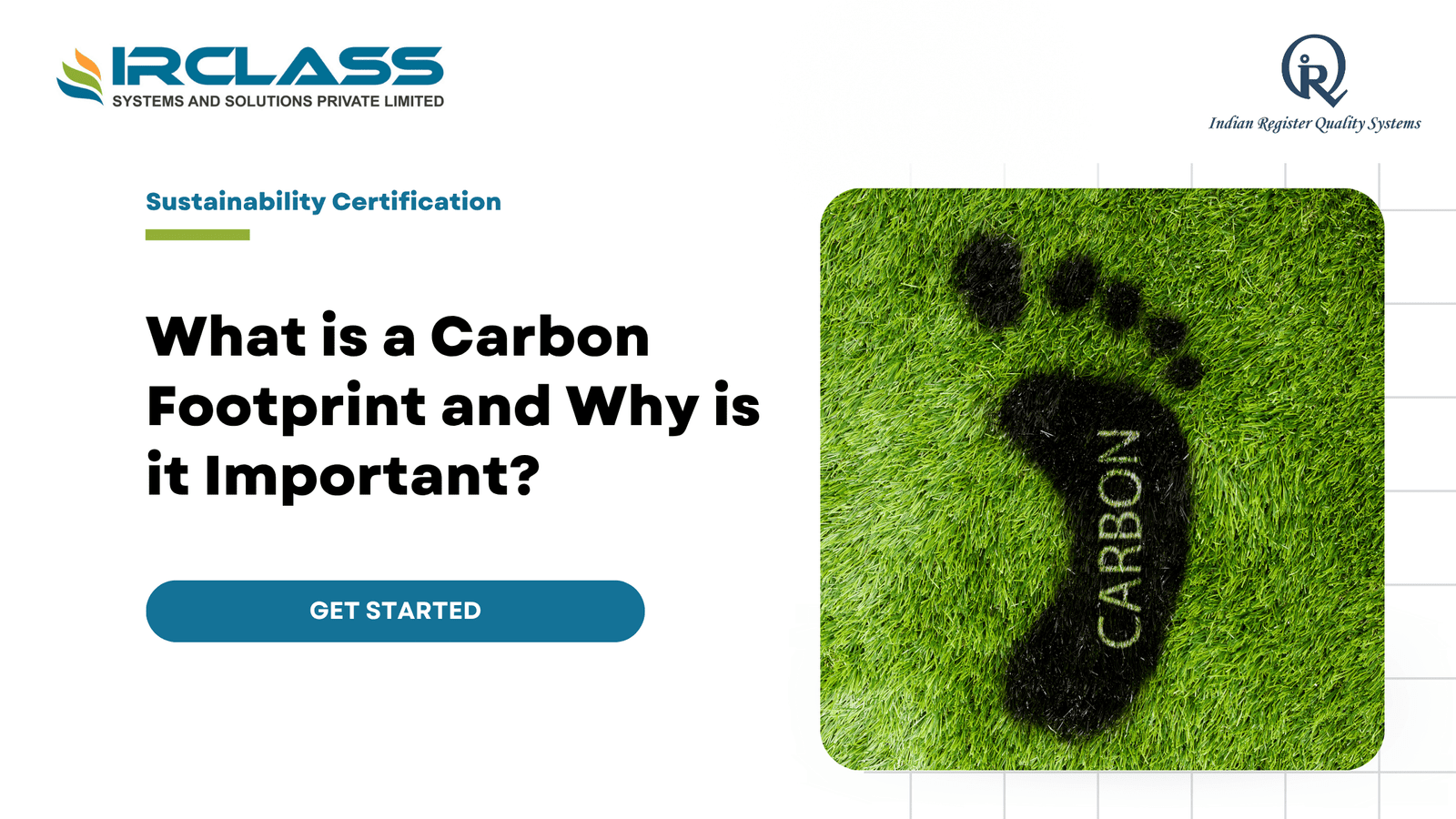
What Is Carbon Footprint Verification & Why It’s Critical for Your ESG Goals
Carbon footprint is not just a number. It’s a signal. It tells the world how your business interacts with the environment. And as ESG becomes a core part of how investors, customers, and regulators judge companies, that signal needs to be clear and credible. Carbon footprint verification is the process of checking that your emissions data is accurate, complete, and reliable. It’s how you show that your reporting is real, not just good intentions. Without it, your ESG strategy is just a story. With it, you’ve got proof. Why Carbon Footprint Matters in ESG ESG stands for Environmental, Social, and Governance. The “E” is often the hardest to measure—but also the most urgent. From climate regulations to investor pressure, environmental performance is under the spotlight. Carbon emissions are at the center of that conversation. If you can’t measure your carbon footprint, you can’t reduce it. And if you can’t prove what you’ve measured, no one will take it seriously. That’s where verification comes in. It’s Not Just About Saving the Planet—It’s About Staying in Business Governments are introducing stricter climate rules. Investors are screening for climate risk. Big corporations are auditing their supply chains for emissions. If you can’t show your numbers—or worse, if they’re wrong—you lose out. Carbon footprint verification helps you stay compliant, avoid greenwashing claims, and build trust. It’s not just good for the planet. It’s smart business. What Verification Actually Does Verification is not an internal review. It’s not based on assumptions. It’s a third-party check. Auditors look at your data, your process, and your calculations. They test it against international standards like ISO 14064 or the GHG Protocol. They don’t just ask “did you do it?” They ask “did you do it right?” Once verified, your carbon data becomes credible. You can use it in ESG reports, investor updates, sustainability claims, and supplier assessments. Why Verification Adds Real Value Anyone can publish an ESG report. But not all reports are created equal. Verified carbon data gives you a competitive edge. It shows stakeholders that you take sustainability seriously—and that your numbers are backed by real checks. It also helps you spot problems. During verification, issues often surface that might have been missed: incorrect assumptions, missing data, and wrong conversion factors. Fixing them early means better decisions and lower risk. Carbon Footprint Verification Supports Better Strategy When you know your real impact, you can make real plans. Verified data helps you set science-based targets. It lets you track progress over time. It helps you compare sites, teams, and suppliers. And it helps you talk about climate action with confidence. This is about more than optics. It’s about building a strategy that’s grounded in truth, not guesswork. Companies Are Being Held Accountable Carbon claims are under pressure. Consumers are asking for proof. Regulators are cracking down on false sustainability messages. Investors are running climate stress tests. If your carbon data isn’t verified, you’re exposed. There’s a growing expectation: show your math. If you say you’ve cut emissions by 20%, stakeholders want to know how you calculated it. Verified data removes doubt. What Gets Verified? A proper carbon footprint verification looks at: Every step is checked. If something doesn’t add up, it gets flagged. That’s how you move from estimates to accuracy. Carbon Verification Builds Market Confidence Today, ESG scores affect your brand, your funding, and your partnerships. A strong carbon verification can lift your ESG rating. It can make ESG data providers take you seriously. It can give banks and investors more comfort when evaluating risk. It’s also becoming part of procurement. Large buyers are now requiring emissions data from their suppliers. Verified numbers get you in the door faster. It’s Cheaper to Get It Right the First Time Unverified data might seem faster. But mistakes are expensive. Fixing a flawed report, responding to scrutiny, or correcting the record later costs time and trust. Verification saves you from that. Think of it like an audit for your emissions. It gives you confidence that what you’re reporting is real. And it lets others trust you without second-guessing. Verification Is a Step Toward Net Zero Many companies have set net-zero targets. That’s great. But targets without credible measurement are just promises. You can’t manage what you can’t measure—and you can’t prove what you haven’t verified. Carbon footprint verification isn’t just a checkbox. It’s the foundation. Once your emissions data is solid, you can build real reduction plans, track real outcomes, and show real progress. The Push Is Coming from All Sides The pressure to verify is growing: This isn’t a future problem. It’s happening now. Businesses that move first get ahead. The rest get left behind. Don’t Wait for Regulation It’s easier to start when the choice is yours. Waiting for mandatory rules means rushing under pressure. It means higher costs, more mistakes, and more stress. Voluntary carbon footprint verification puts you in control. You set the pace. You choose the scope. And you’re ready when regulation comes. You Don’t Need to Have Everything Perfect You can start small. Pick one site, one product line, or one business unit. Verify that. Build your approach over time. What matters is that you start. Verification is not about being flawless. It’s about being transparent, consistent, and committed. Conclusion Carbon footprint verification is no longer just a best practice. It’s a business need. It strengthens your ESG reports, protects your brand, and positions you for the future. The companies that take this seriously today will be the ones leading tomorrow. If you’re ready to verify your carbon footprint, work with a partner who knows how to do it right. IRQS brings experience, credibility, and a clear process. They help you move from estimates to evidence, so you can build trust where it counts.
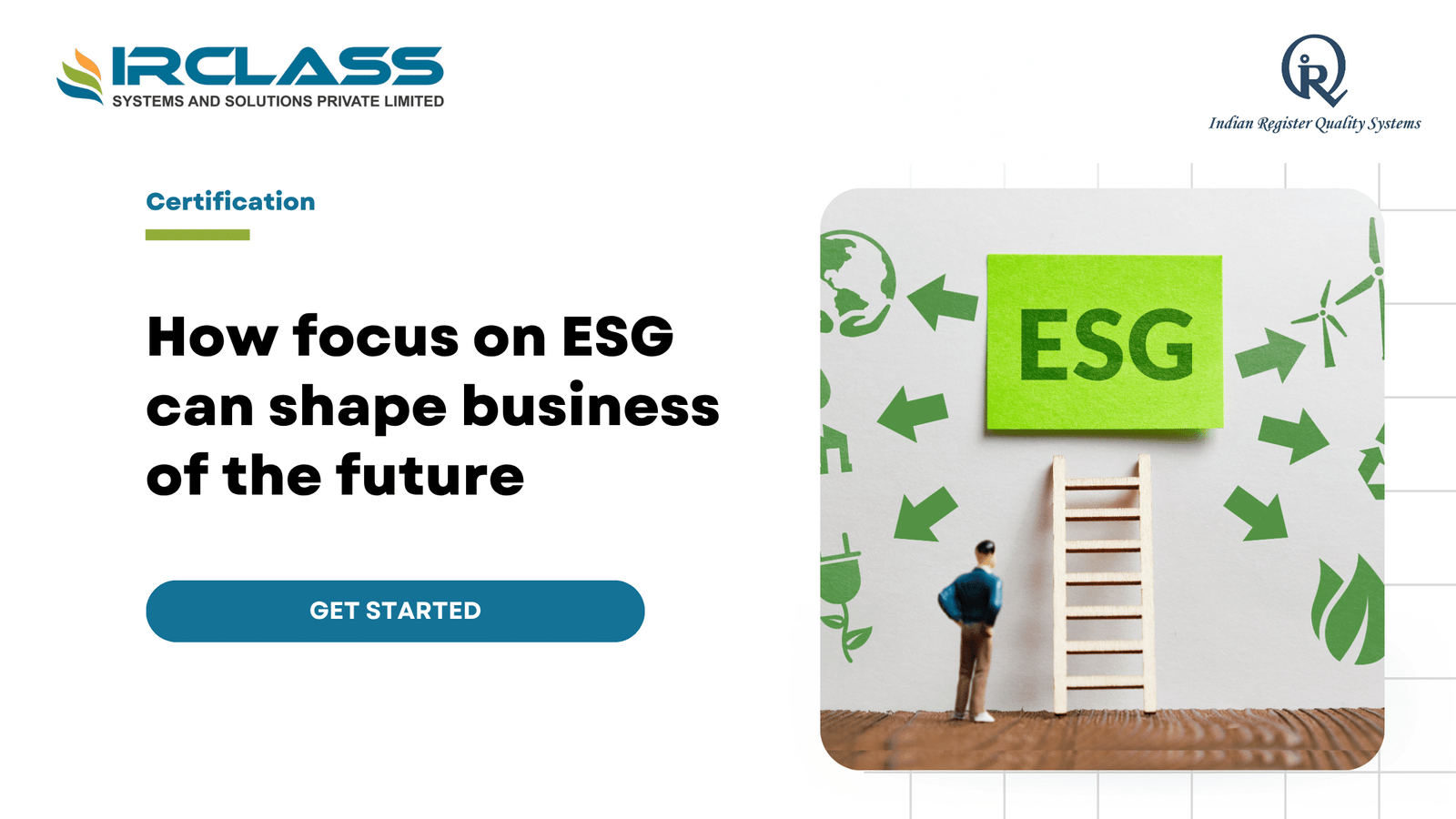
Why ESG Reporting Is the Future of Business Strategy
Businesses are evolving. Investors are looking beyond profit and loss statements. Customers are asking what companies stand for. Employees want to work for organizations that care about more than just the bottom line. That’s where ESG reporting comes in. ESG stands for Environmental, Social, and Governance. It’s not just a trend. It’s becoming a core part of how businesses operate, make decisions, and plan for the future. If you’re not thinking about ESG reporting today, you’ll be playing catch-up tomorrow. ESG Is Not Optional Anymore Regulations are tightening. Governments around the world are rolling out mandatory ESG disclosures. Investors are demanding transparency. And large corporations are asking their vendors and partners to show ESG performance. This means even smaller companies need to be ready. What used to be voluntary is becoming essential. Businesses that can’t show how they’re managing environmental impact, treating employees, and governing responsibly are at risk of losing deals, funding, and reputation. It’s Not Just About Risk—It’s About Opportunity ESG isn’t just a shield. It’s a lever. Companies that lead in ESG are attracting better talent. They’re winning the trust of consumers. They’re unlocking new sources of capital. Investors are now using ESG scores to decide where to place their money. Customers are willing to pay more for products from companies that align with their values. And top employees want to work where they see purpose, not just paychecks. So, ESG reporting doesn’t just help you avoid fines or bad press. It helps you grow. Why ESG Reporting Builds Better Businesses When companies track ESG data, they start asking better questions. How much energy are we using? Are our suppliers treating their workers fairly? Do we have diverse leadership? Are we transparent about decision-making? These aren’t just compliance issues. They’re business strategy issues. Companies that answer these questions can spot inefficiencies. They can build stronger supply chains. They can respond faster to crises. That makes them more resilient. Good ESG reporting also brings discipline. It creates clear goals and accountability. It forces leaders to measure what matters—not just what’s easy. What ESG Reporting Includes A strong ESG report covers three pillars. Each one tells part of the story: Each area connects back to long-term value. That’s why ESG reporting is now part of investor meetings, RFP responses, and boardroom discussions. ESG Reporting Is a Signal of Long-Term Thinking Short-term results are easy to chase. But they’re fragile. One scandal, one lawsuit, or one environmental mishap can destroy years of work. ESG helps companies focus on the long game. It shows that leaders are thinking beyond this quarter. They’re managing risk, building trust, and investing in the future. And markets are noticing. The companies that survive downturns and win in the long run are the ones with strong ESG foundations. The Pressure Is Rising More than 90% of the S&P 500 now publish ESG reports. Banks are factoring ESG risk into lending decisions. Governments are linking ESG performance to procurement contracts. That’s not a coincidence. It’s a shift. If your business isn’t preparing for ESG reporting, you could lose out. Deals will slow down. Capital will become more expensive. Customers will go elsewhere. And eventually, regulators will come knocking. Doing nothing isn’t safe anymore. Technology Is Making ESG Easier The good news? ESG reporting doesn’t have to be manual or messy. Tools are improving. Data is easier to collect and track. Standards are becoming clearer. What used to take months can now be done in weeks. And if you start early, the workload stays manageable. You can embed ESG into your existing systems, rather than treating it as a bolt-on. That saves time, money, and headaches later. You Don’t Need to Be Perfect—You Just Need to Start One of the biggest myths is that you need perfect ESG scores from day one. That’s not true. What matters is progress and honesty. Stakeholders want to see that you’re aware, committed, and improving. Transparency builds trust. Even if you’re still working on your goals, sharing the journey makes a difference. ESG reporting isn’t about saying “we’ve arrived.” It’s about showing you’re on the right path. Small Companies Can Lead, Too ESG isn’t just for the big players. In fact, smaller companies have an advantage. They can move faster. They can build ESG into their culture from day one. They can align teams quickly and show early wins. And when they do, they become more attractive partners. Large enterprises now ask ESG questions during vendor onboarding. If you’re already prepared, you move to the front of the line. 5 Reasons ESG Reporting Matters Right Now That’s not a trend. That’s a shift in how the world does business. Looking Ahead: ESG as a Competitive Advantage As markets evolve, ESG will separate leaders from laggards. It will define who gets funded, who wins contracts, and who stays in the game. Companies that treat ESG reporting as a checklist will fall behind. The ones that see it as strategy will lead. The sooner you act, the more control you have. You can shape the narrative, build credibility, and stay ahead of change. Waiting only makes things harder and more expensive. Start Before You’re Forced To By the time regulators come knocking, it’s too late to start. You’ll be reacting, not leading. ESG reporting is easier when it’s proactive. When it’s part of your planning—not an afterthought. That’s the mindset companies need now. ESG isn’t just a report. It’s a reflection of how your business sees the world—and its role in it. Conclusion ESG reporting is here to stay. It’s not just about compliance. It’s about building a business that’s trusted, resilient, and ready for the future. Whether you’re a startup or an established brand, now is the time to act. If you want to start your ESG journey the right way, work with someone who understands the full picture. IRQS has helped companies across industries build strong ESG frameworks that stand up to scrutiny. Their team knows what it takes to go
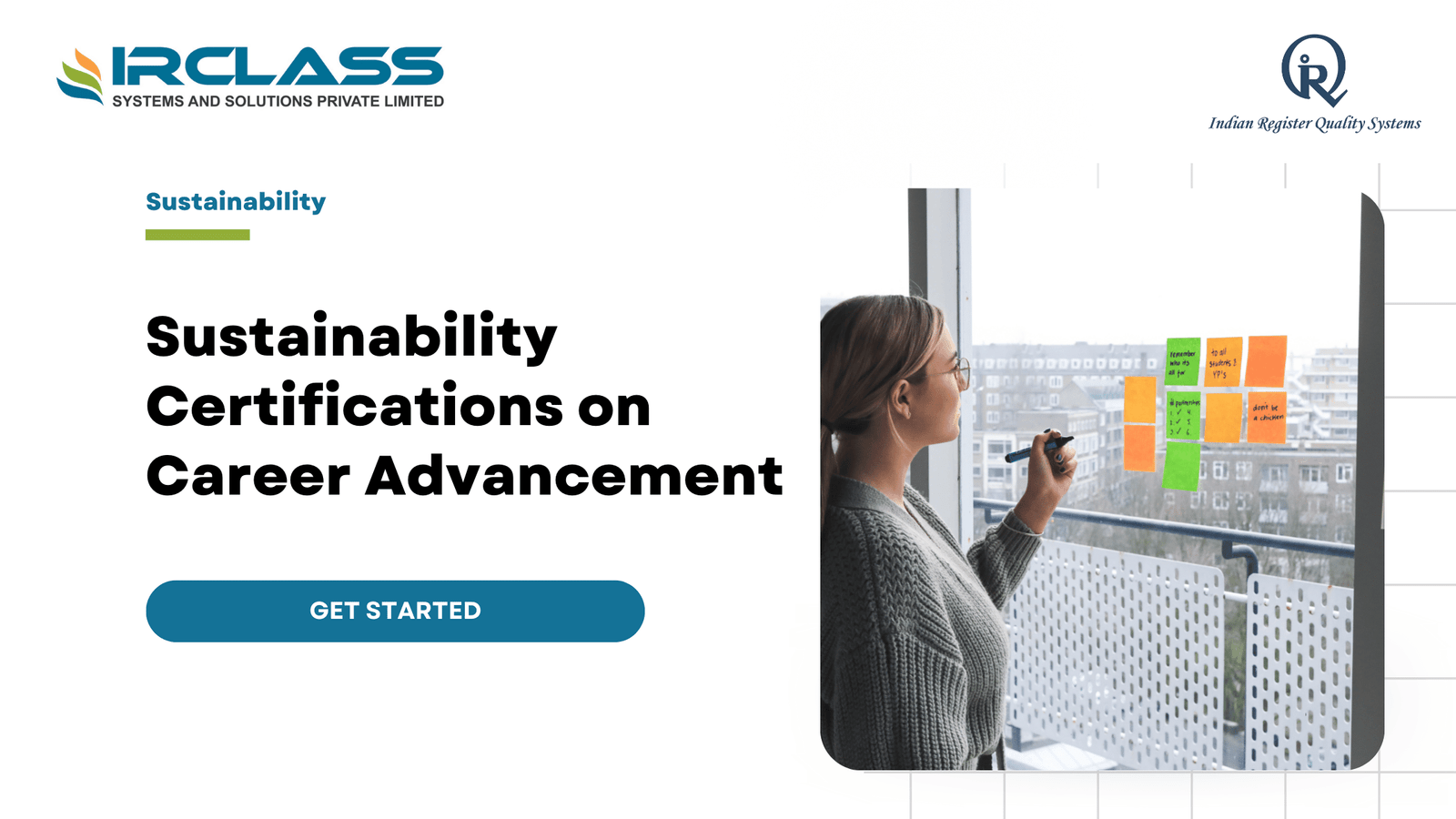
The Impact of Sustainability Certifications on Career Advancement
In the modern workforce, one thing is clear: sustainability isn’t just a buzzword—it’s a career driver. As companies pivot toward greener, more ethical operations, professionals who understand sustainability practices are in high demand. And if you’re someone looking to move up the ladder, broaden your role, or future-proof your skill set, sustainability certifications might just be the smartest investment you can make. These certifications don’t just look good on paper—they signal that you’re equipped for the next generation of challenges. In a world where ESG (Environmental, Social, and Governance) metrics are reshaping entire industries, staying ahead means aligning your career with the values that matter now and tomorrow. Why Sustainability Is a Career Differentiator The employment opportunities are dynamic and are changing at a very fast rate. In today’s world, technical skills or leadership experience alone are not sufficient in the workplace. They are looking for people who can assist them in achieving their sustainability goals and who can contribute to sustainable decision-making as well as the growing demands of the stakeholders. Sustainability certifications demonstrate that you know about sustainability. Not only are you aware of these trends but also prepared to be a leader within these trends. Whether it is reducing the carbon footprint of a firm, managing sustainable supply chains, or meeting environmental requirements, these are not anymore options but imperatives. Real Value Beyond the Resume While the former gives the academic knowledge, the latter gives the practical knowledge that is applicable in the current job market. It shows that you know what is going on in the world today in terms of LCA and carbon footprinting, from the assessments to accounting. This kind of learning also builds confidence in the learner since they are able to practice what they have learnt. You can contribute more to the topic of strategy, risk, or corporate responsibility. That credibility results in more exposure, better reception from the top management, and new job opportunities. Unlocking New Career Paths For many professionals, sustainability certifications are a chance to change the field of activity altogether. Sustainability is not an issue that belongs to the environmentalists alone; it is an issue that affects operations, finance, human resource, and marketing departments. For example, sustainability analysts, ESG consultants, environmental managers, green procurement specialists, and the like. And if you are already in a leadership position, sustainability credentials can only add to your credibility. They help in the integration of sustainability into business operations and guarantee that your team is in harmony with the rest of the company regarding environmentalism. It’s Not Just About the Environment Sustainability is such a powerful word because it can be used in ethical, efficient, and even resilient ways, as well as social responsibility. In the present-day world, organizations are not only judged by their revenues but also by the effect they have on people and the environment. Certifications make you think in terms of long-term value creation. It is rather rare and, at the same time, it is valued very much. It shows to the employers that you understand how sustainability is connected to risk, reputation, and innovation. Employers Are Watching Here is a little secret that the industry does not want you to know: there are many organizations out there that are seeking certified sustainability professionals. In your job search, you may find some job openings that require certification or recommend it as a plus. Having one gives you an advantage – not only in the aspect of employment but also in terms of promotions, cross-division transfers, and promotions to managerial positions. In fact, most employers consider certification as an indication that you are a proactive person. It indicates that you are ready to grow and that you are ready to take on more responsibilities. Sustainability = Leadership Material Certification means that you are capable of influencing policies, creating awareness in teams, and designing solutions that align with such global goals as the SDGs. These are not just checklists but the paradigms that govern the operations of the world. And the people who can speak that language? They are the future leaders of their respective fields. The Global Nature of Sustainability Certifications The other advantage of these certifications is that they are accepted in most parts of the world. Regardless of whether one is planning to work in another country, deal with clients from other countries, or change careers, sustainability credentials are transferable. They speak in terms of responsibility, transparency, and efficiency.In a connected world, that is the kind of language you would wish to have on your professional profile. Advantages of Attaining a Sustainability Certification Therefore, let me briefly summarize. Here are five reasons why one should consider getting a sustainability certification: Assists you in making your resume more appealing and increase your chances of being selected in the job market. Learning That Fits Your Life Worried about the time commitment? It is also worth mentioning that most sustainability certifications are designed to be scalable. Many of them offer online classes, evening and weekend classes, and flexible schedules that are convenient for working individuals. And the return on investment is clear. This is why even a short certification can make a huge difference in your career path. It is not only about the content, it is about the visibility, the topicality, and the positioning in the context of the world that is becoming more and more different. You Don’t Need to Be in a “Green” Job to Benefit This is a big one. It is not mandatory to work for a climate science or renewable energy firm to experience the benefits. Sustainability concerns are not limited to any particular sector, whether it is fashion, finance, or the food industry. In any industry, from logistics to IT, education or hospitality, there is an increasing need for people who can make things cleaner, smarter, and more sustainable. IRQS Can Help You Get There When you are planning to pursue a sustainability certification in order to enhance your career, it is
Search
Useful Links
Recent Posts
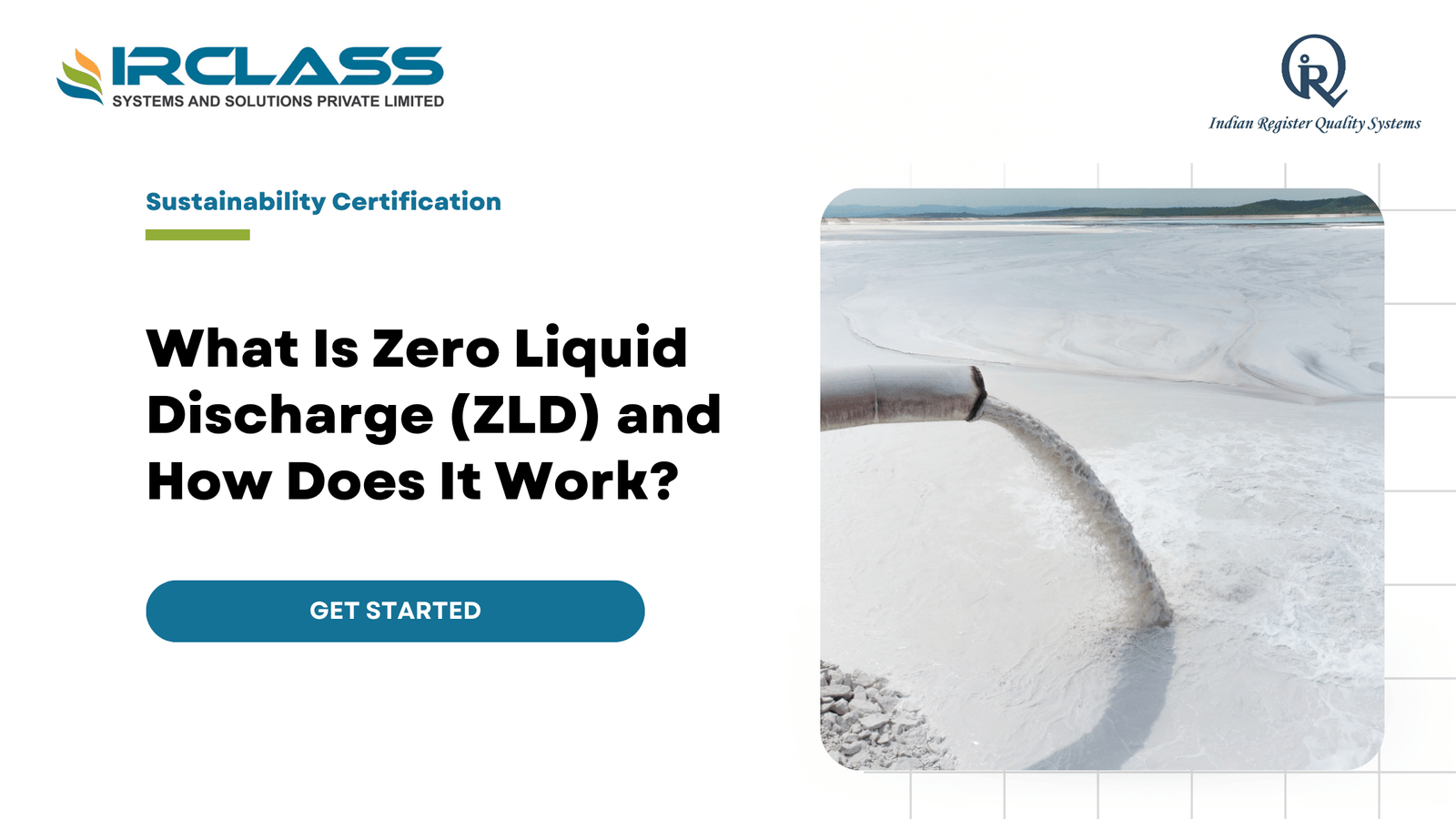
What Is Zero Liquid Discharge (ZLD) and How Does It Work?
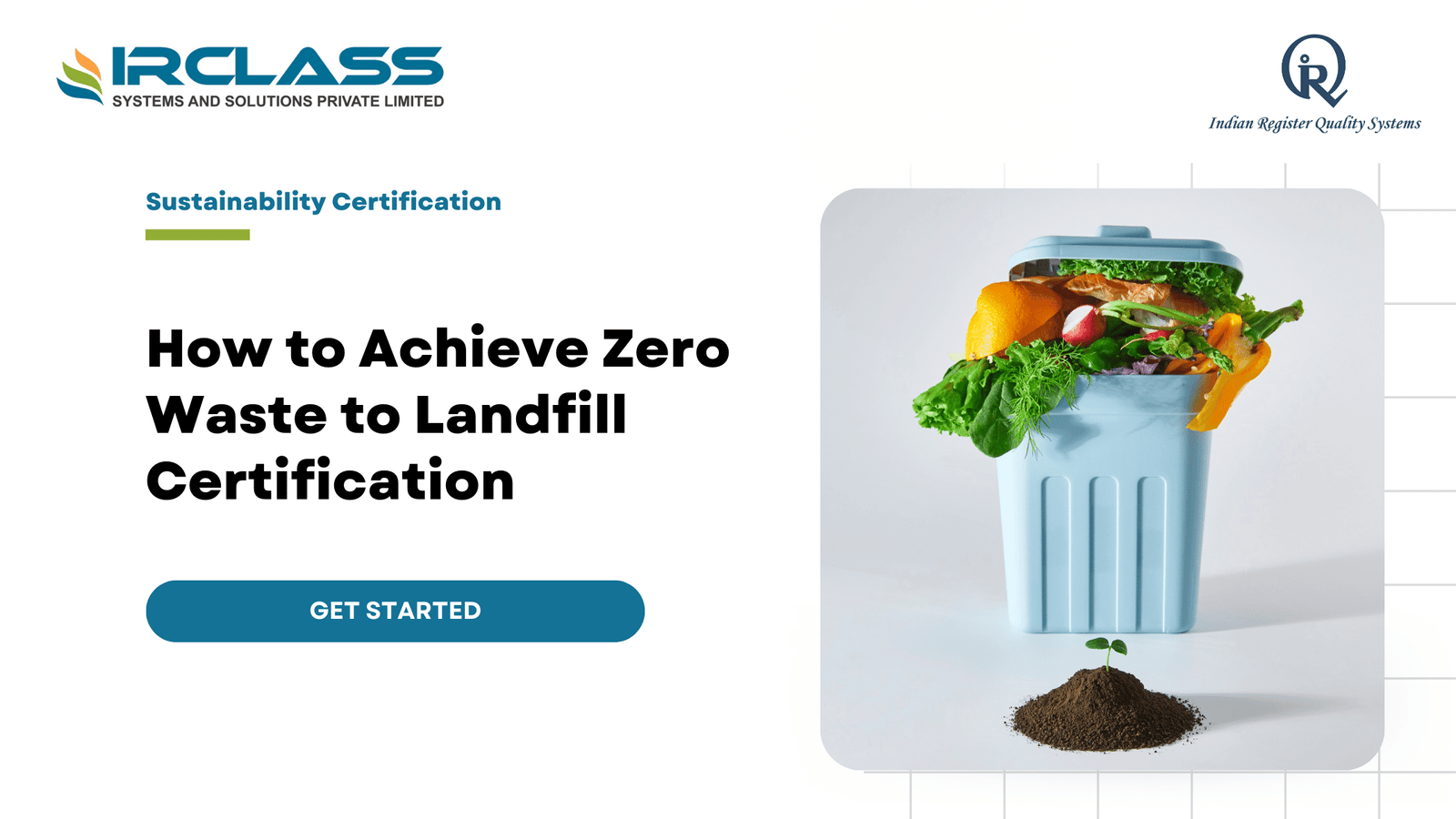
How to Achieve Zero Waste to Landfill Certification: Step-by-Step Guide
